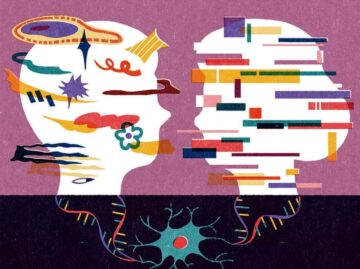Enjoying the content on 3QD? Help keep us going by donating now.
Ann Thomas in Harvard Magazine:
 WHY WOULD A successful college student abruptly stop attending class, ignore his roommates, and begin hallucinating? How does an elderly woman suddenly forget how to navigate a route she has routinely driven for years?
WHY WOULD A successful college student abruptly stop attending class, ignore his roommates, and begin hallucinating? How does an elderly woman suddenly forget how to navigate a route she has routinely driven for years?
These two hypothetical scenarios seem unrelated. The student’s behavior suggests schizophrenia, typically diagnosed in people in their twenties and thirties, while the woman exhibits a classic symptom of dementia, which is more common in the elderly. But researchers from the Broad Institute and Harvard Medical School have uncovered a link between the two conditions. Although the initial focus of the study was on the roots of schizophrenia, the group found some surprising similarities between the brains of patients with schizophrenia and those of healthy older adults.
Flier professor of biomedical science and genetics Steve McCarroll, who previously published groundbreaking work on the genetic roots of schizophrenia, aimed to characterize the biological changes associated with schizophrenia at the level of individual cells. “Knowing the genes is just the first step,” he said.
The next step is to learn which genes get turned on in cells, a process termed gene expression. Emi Ling, a postdoctoral fellow who worked closely with McCarroll and associate professor of psychiatry Sabina Berretta on the project, used single nucleus RNA sequencing to measure and track gene expression in the nucleus of every cell in a tissue sample.
More here.
